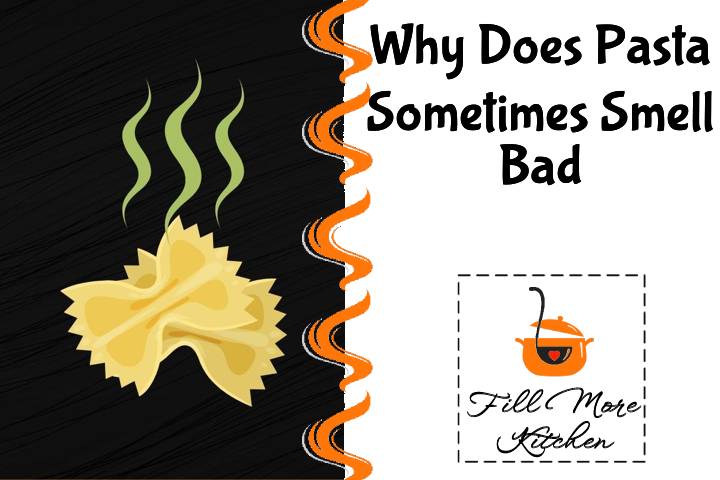Most pasta enthusiasts would agree that there’s nothing quite as comforting as a bowl of pasta coated in either white or red sauce and sprinkled with cheese.
Discovering that your pasta has a foul odor after eagerly anticipating eating it can be quite disheartening.
On occasion, pasta may emit an unpleasant odor due to spoilage or expiration, with improper storage and expired ingredients being the primary culprits for pasta expiration.
This article will provide you with all the necessary information regarding the reasons behind the unpleasant odor of your pasta.
Additionally, we will provide you with methods to prevent this issue and offer some suggestions for extending the longevity of your pasta.
Why Does Pasta Sometimes Smell Bad?
If you detect a musty smell coming from your pasta, it is a sign that the pasta has gone bad and should not be eaten.
If you detect an unpleasant odor, dispose of the pasta.
What Does Rotten or Bad Pasta Smell Like?
Pasta that is spoiled or not good to eat emits a pungent and unpleasant odor, which can be quite bothersome.
Normally, the aroma of fresh pasta is a combination of eggs and flour, therefore any scent that deviates from this, no matter how subtle it may be, indicates that the pasta has gone bad.
How Can You Tell If Pasta Has Gone Bad?
Aside from the odor of spoiled pasta, there are other indications that pasta has gone bad:
Cooked pasta
One of the most obvious indications that cooked pasta has gone off is when it becomes slimy or tacky. Additionally, if you spot white, brown, or black mold specks on your pasta, discard it.
Uncooked Pasta
Despite having an expiration date, uncooked pasta will not go bad, but its quality will deteriorate over time.
If you notice white spots on dry uncooked pasta, it has likely gone bad, except for spicy varieties that may have a different appearance.
However, when pasta is kept in the pantry for a prolonged period, it becomes susceptible to the growth of small parasites, rendering it unsuitable for cooking.
How Long Can Dry Pasta Maintain Its Quality After Its Expiration Date?
Dry pasta can remain edible for up to six months after the sell by date is printed on it, as long as it has not been opened or exposed to humidity.
One useful suggestion is to cook a small amount of the pasta first if it has been stored in the pantry for an extended period, to determine whether it is still edible.
Avoid ruining a dish of tomato sauce and cheese by discovering that the pasta has gone bad.
Can Consumption of Expired Dried Pasta Make You Sick?
Dried pasta beyond its expiration date is generally safe to eat and won’t make you sick, but consuming expired fresh or cooked pasta can be risky and may cause illness.
How Long Can Pasta Maintain Its Quality After Its Expiration Date?
Fresh uncooked pasta can remain in good condition for approximately four to five days after the date of expiration indicated on its packaging.
Furthermore, it is important to keep the pasta refrigerated to prevent it from spoiling before its expiration date.
What Is the Shelf Life for Fresh Pasta?
The shelf life for fresh pasta is only three days because it contains fresh eggs and other perishable ingredients, making it unsuitable for long-term storage.
Different Strange Smells Pasta Can Emit (Why It Does)
Individuals who like pasta have their own unique method of cooking it, which can result in a slightly different scent for each person’s pasta.
Nonetheless, it is not advisable to disregard all odors as acceptable.
Below are some typical unusual odors that pasta can emit and their possible reasons:
Pasta Smells Sour smell
Using a sour type of cheese or spinach in your pasta fillings will result in a sour taste in the pasta.
Moreover, buying pre-flavored or dyed pasta can result in a sour smell. It is recommended to verify the flavor indicated on the packaging before cooking.
It is possible that the unpleasant odor is due to the pasta being spoiled.
Pasta Smells Egg
Typically, the odor resembling that of eggs in pasta is a result of incorporating eggs into the pasta dough.
In contrast, hydrogen sulfide may be released when preparing the pasta using eggs. This gas should not have any effect on your health unless you are unwell.
Nevertheless, if the aroma is disagreeable or overwhelming, resembling that of rotten eggs, it is possible that the eggs might have spoiled while the pasta was being dried.
Typically, the reason for bad-smelling pasta is due to being left to dry in a warm or damp environment.
Thankfully, you can reduce or eliminate the smell of eggs by implementing the subsequent methods:
Firstly, wash the pasta using a strainer.
Next, add the pasta to a pot of boiling water.
When the pasta is thick, it should be boiled for eight to ten minutes over high heat, and if it is thin, it should be boiled for five minutes.
After completing the fourth step, switch off the stove, get rid of the water, and wash it meticulously.
To avoid the egg smell and maintain the chewiness of the pasta, it is recommended to submerge it in a bowl of iced water after Step 4, which prevents any residual heat from cooking the pasta and yields better results.
Pasta Smells Plastic
If you detect a plastic odor in your pasta, it may be due to microwaving or refrigerating it in a plastic container. To prevent this smell, use glass containers when microwaving or storing the pasta in the refrigerator.
On the other hand, the odor of plastic could indicate that the pasta you bought from the supermarket was produced by a malevolent producer who manufactures it illegally.
If pasta smells bad, it is best to discard it and report the issue to the relevant authorities.
What Causes Boiling Pasta to Sometimes Smell Bad?
If you detect an unusual odor while cooking pasta, it may indicate that the water being used is contaminated. It is important to confirm that the water is free of impurities before proceeding.
If you notice a bad smell in your pasta, it could be due to contaminated water from your tap. In this case, it is recommended to have a professional plumber examine your plumbing system for any potential issues with dirty, clogged, or rusted metals used to transport the water.
One possible explanation for bad-smelling pasta is the premature addition of salt to the boiling water, which can impact both its flavor and aroma; nevertheless, it’s important to note that if you add salt too late, it may not have enough time to dissolve properly.
When boiling pasta, it is crucial to be strategic in adding salt to the water to avoid changing the flavor of the pasta.
How Long Can Cooked Pasta Be Stored In the Refrigerator?
Although refrigerating cooked pasta can prolong its shelf life, it is advisable not to store it for more than five days.
Discard the pasta if it has been refrigerated for more than five days.
Moreover, the presence of vegetables in the fridge can cause an unpleasant odor in the pasta or create an environment for decay and fungus to develop.
Although pasta that has been cooked with sauce can be stored in the refrigerator for over five days, this is due to the fact that the sauce aids in preserving the components of the pasta.
However, if you freeze pasta, it can extend its shelf life for a maximum of three months, but this will greatly affect the flavor of the pasta.
Can You Store Dry Pasta In The Refrigerator?
Refrigerating dry pasta does not extend its shelf life. Therefore, you can utilize that space to accommodate other items.
Additionally, storing pasta in the refrigerator can affect its quality and alter its taste due to changes in the air.
Can You Neutralize the Pasta Smell With Other Ingredients?
It is not possible to eliminate the bad smell of pasta by adding other ingredients because the aroma is too weak.
Tips on Proper Handling of Pasta
The handling and storage of food greatly affects its shelf life and quality.
Make every effort to establish optimal conditions to achieve the utmost quality and ensure that the product you consume is safe.
Here are some fundamental guidelines to adhere to.
Tip 1: To avoid the growth of mold, it is important to store dry pasta in a place that is dry, dark, and free from moisture.
Tip 2: To prevent pests and moisture from contaminating the dried pasta, either seal it tightly or transfer the remaining contents to an airtight bag after opening.
Tip 3: It is advisable to keep fresh, uncooked pasta in a cool place and ensure that it is cooked before the expiry date.
Tip 4: Refrain from buying fresh pasta that has been leftover.
Tip 5: It is advisable to refrain from cooking a surplus quantity of pasta that you cannot finish within two days to ensure safety.
Tip 6: It is important to avoid leaving the pasta exposed to the air.
Pasta is a common food item found in most homes and can be cooked in various styles.
Make sure to follow the correct procedure to maintain the taste quality of your pasta, so you can enjoy this delicious delicacy in whichever way you prefer.
Make sure to adhere to the instructions mentioned above to maintain the flavor of pasta.
You can also check this video about “Why Does Pasta Sometimes Smell Bad?”
Check out our top 10 reviews!
Related posts
https://fillmorekitchen.com/what-happens-when-you-eat-unwashed-rice/
https://fillmorekitchen.com/does-olive-oil-ruin-non-stick-pans/
https://fillmorekitchen.com/10-foods-that-are-tasteless/
https://fillmorekitchen.com/can-you-eat-turkey-left-out-at-room-temperature/
https://fillmorekitchen.com/can-you-eat-chinese-takeaway-food-that-was-left-out-overnight/



